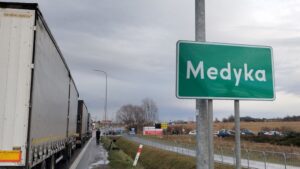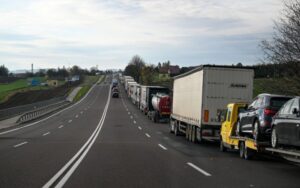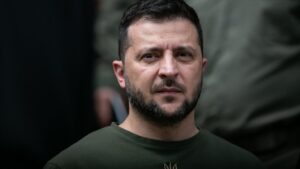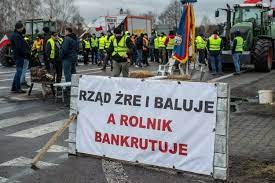
Polish protesters began blocking the checkpoint “Medika-Shegini” on Saturday at 10.00, confirmed the State Border Service of Ukraine.
“According to preliminary information, the action will last 48 hours with a possible extension,” the State Border Service said in a message on its Telegram channel.
According to their data, at present, the accumulation of trucks in front of the checkpoint on the exit from Ukraine is not observed. At the entrance to Ukraine is about 150 trucks.
“Recall, at the entrance to Poland will not be allowed vehicles weighing more than 3.5 tons. At the exit from Poland will be allowed one truck per hour. Restrictions will not apply to cars and buses”, – indicated in the State Border Service.
Earlier about the blockade of trucks at the checkpoint “Medika-Szegyni” wrote the Polish media.

Polish farmers have resumed blocking the Korchova-Krakovets and Medyka-Shehyni checkpoints, the State Border Guard Service of Ukraine reported on its Telegram channel on Thursday morning.
“The protesters on the territory of Poland took such actions today after 09:00. In the direction of the Krakovets checkpoint, the movement of trucks heading towards Ukraine is restricted, and in the direction of Shehyni – both exiting and entering Poland. According to available information, the protesters plan to block traffic in Krakowiec until 9:00 a.m. on April 20, and in Shehynia until 9:00 a.m. on April 19,” the statement said.
According to the border guard agency, on Thursday morning, about 1,500 trucks are waiting in queues in Poland in these directions to cross into Ukraine. No complications are expected for the movement of cars and buses.

Polish farmers continue to block the movement of Ukrainian trucks in three directions, at checkpoints “Yahodyn” and “Rava-Russkaya” cargo vehicles are not allowed to exit Ukraine, said the speaker of the State Border Service of Ukraine Andriy Demchenko.
“As of now there are three directions (blocking traffic), I remind you that before there were 6 checkpoints they blocked (Polish protesters). As of now – 3, if more substantially, these are checkpoints “Yagodin”, “Ugrinov”, as well as “Rava-Russkaya”. And in fact on the two largest of these three checkpoints – “Yahodyn” and “Rava-Russkaya”, Polish farmers do not pass cargo vehicles that follow from Ukraine at all”, – he said on air of the national telethon on Sunday.
According to the speaker of the State Border Service, these two checkpoints have recently recorded zero numbers on the exit from Ukraine, with about 500 trucks in queues.
Polish farmers, Ukrainian trucks, Yahodyn and Rava Russka Andriy Demchenko

Polish farmers continue to block truck traffic at the Yahodyn, Ustyluh, Uhryniv, Rava-Ruska, Shehyni and Krakivets checkpoints, with a total of nearly 2,400 trucks in the queues, according to Andriy Demchenko, spokesman for the State Border Guard Service of Ukraine (SBGS).
“Polish farmers are blocking traffic in six directions. These are the directions of the Yahodyn, Ustyluh, Uhryniv, Rava-Ruska, Shehyni and Krakovets checkpoints. “If we talk about the queues that have formed in Poland because of this, in all these directions, in total, as of this morning, it is about 2,400 trucks, most of all at the Krakovets, Rava-Ruska and Yagodyn checkpoints,” Demchenko said on the air of the national telethon on Sunday.
According to him, the lowest rates of border crossings remain for trucks. Over the past day, about 90 trucks crossed the border in both directions at Shehyni checkpoint, and 50 trucks crossed the border to Ukraine at Yagodyn checkpoint, but Polish farmers continue to completely block the movement of trucks heading from Ukraine to Poland.
There is no blocking of cars and buses.

President of Ukraine Volodymyr Zelenskyy said that the situation with the blockade of the border by Polish farmers is a political one, but the parties need joint decisions and a fair way out.
“What is happening on our western border – the border with Poland – cannot be taken as something normal or ordinary. Only 5% of our agricultural exports pass through the Polish border. Therefore, in fact, the situation is not about grain, but rather about politics,” he said in an evening video address.
Thus, according to him, “compared to the news from near Kupyansk, where the enemy artillery does not stop, the news from the border with Poland looks just mocking.”
The Head of State emphasized the need to find a solution to this situation.
“We need simple and clear justice. We need joint decisions, rational decisions to get out of this situation. The decisions are ours with the Poles, first of all, and everyone in Europe who cares about the fate of Europe,” he said.
As reported, Polish farmers announced the beginning of a full blockade of the border on February 20, including the blocking of road checkpoints, railroad entrances and exits to ports.

Polish farmers will block all border crossings as well as transport hubs between Poland and Ukraine from February 20, RMF FM writes.
“Not only border crossings will be blocked, but also transport hubs, access roads to railway transshipment stations and seaports,” a communiqué from the Solidarity farmers’ union said, as quoted by Poland’s RMF FM.
Earlier, on February 9, Solidarity announced a 30-day general strike by farmers.
Polish agrarians say they are protesting against the uncontrolled influx of goods from Ukraine into Poland due to the opening of borders by the European Union. It is pointed out that “the lack of regulation calls into question the profitability of agricultural production, processing and other agriculture-related industries.”
“Therefore, for February 20, as part of the 30-day general strike of farmers, we announce that all protests will be aimed at a complete blockade of all Polish border crossings with Ukraine and protests on the ground,” the farmers told Solidarity.
blockade of border crossings, Polish farmers, Polish farmers' strike